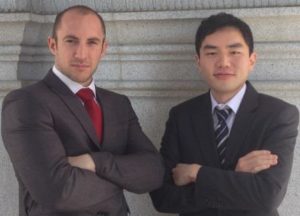Commil USA, LLC, v. Cisco System, Inc.

Juelsgaard Intellectual Property and Innovation Clinic students Joseph Dollin (JD ’15) and Hyosang (Mark) Kim (JD ’16) recently co-authored, as co-counsel with Public Knowledge, an amicus curiae brief urging the U.S. Supreme Court to protect innovation by preserving the current intent requirement for liability for inducing copyright infringement. The brief was submitted in an important patent case, Commil USA, LLC, v. Cisco System, Inc., addressing whether an alleged patent infringer’s good faith belief that a patent is invalid is a defense to inducement of patent infringement under 35 U.S.C. § 271(b). The petitioner argued to the Court that good faith belief is not relevant to the intent requirement for inducement and thus is not a defense. Instead, it proposed that the unilateral act of giving notice of infringement to an alleged patent infringer should be sufficient to satisfy the intent requirement of patent law — effectively eliminating the scienter requirement altogether.
The Juelsgaard Clinic’s brief, on behalf of Public Knowledge, The R Street Institute, The American Library Association, The Association of Research Libraries, The Association of College and Research Libraries, and the Center for Democracy and Technology as amici, argued that such a low intent requirement is irreconcilable with the current, essential standard for copyright inducement – that a party must have culpable intent to cause acts of infringement rather than merely received notice of claims of infringement. The petitioner’s proposed standard is deeply troubling to amici, who share a common interest in a balanced copyright system that does not stifle innovation.
The amicus brief expressed particular concern that upholding Commil’s proposed standard could risk spilling over into copyright law due to the historic kinship between patent and copyright law. If the petitioner’s proposed standard were adopted and applied to copyright law, substantial dangers would be created, including putting product and service providers at the risk of copyright infringement liability, potentially eviscerating the vital Sony substantial non-infringing use exception to contributory infringement, and ultimately stifling innovation by impeding the advancement of technology through the threat of inducement liability.
